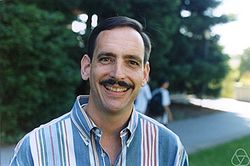W. Hugh Woodin
W. Hugh Woodin | |
|---|---|
 Hugh Woodin in 1994 | |
| Born | April 23, 1955 Tucson, Arizona, U.S. |
| Alma mater | University of California, Berkeley |
| Known for | Woodin cardinals, Ultimate L, Ω-logic |
| Scientific career | |
| Fields | Mathematics |
| Institutions | University of California, Berkeley California Institute of Technology Harvard University |
| Doctoral advisor | Robert M. Solovay |
| Doctoral students | Joel David Hamkins Gregory Hjorth Joan Bagaria |
William Hugh Woodin (born April 23, 1955) is an American mathematician and set theorist at Harvard University. He has made many notable contributions to the theory of inner models and determinacy. A type of large cardinals, the Woodin cardinals, bears his name. In 2023, he was elected to the National Academy of Sciences.[1]
Biography
[edit]Born in Tucson, Arizona, Woodin earned his Ph.D. from the University of California, Berkeley in 1984 under Robert M. Solovay. His dissertation title was Discontinuous Homomorphisms of C(Ω) and Set Theory. He served as chair of the Berkeley mathematics department for the 2002–2003 academic year. Woodin is a managing editor of the Journal of Mathematical Logic. He was elected a Fellow of the American Academy of Arts and Sciences in 2000.[2]
He is the great-grandson of William Hartman Woodin, former Secretary of the Treasury.[citation needed]
Work
[edit]He has done work on the theory of generic multiverses and the related concept of Ω-logic, which suggested an argument that the continuum hypothesis is either undecidable or false in the sense of mathematical platonism. Woodin criticizes this view arguing that it leads to a counterintuitive reduction in which all truths in the set theoretical universe can be decided from a small part of it. He claims that these and related mathematical results lead (intuitively) to the conclusion that the continuum hypothesis has a truth value and the Platonistic approach is reasonable.
Woodin now predicts that there should be a way of constructing an inner model for almost all known large cardinals, which he calls the Ultimate L and which would have similar properties as Gödel's constructible universe. In particular, the continuum hypothesis would be true in this universe.[3]
Honors
[edit]In 2008, Woodin held the Gödel Lecture titled The Continuum Hypothesis, the Conjecture, and the inner model problem of one supercompact cardinal.
In 2018, he was the Tarski lecturer.
See also
[edit]References
[edit]- ^ http://www.nasonline.org/news-and-multimedia/news/2023-nas-election.html
- ^ "Book of Members, 1780–2010: Chapter W" (PDF). American Academy of Arts and Sciences. Retrieved June 3, 2011.
- ^ Wolchover, Natalie (2013-11-26). "To Settle Infinity Dispute, a New Law of Logic". Quanta Magazine. Retrieved 2024-03-23.
External links
[edit]- W. Hugh Woodin at the Mathematics Genealogy Project
- Woodin, W. Hugh (2010). The Axiom of Determinacy, Forcing Axioms, and the Nonstationary Ideal. Walter de Gruyter. ISBN 978-3-11-019702-0. OCLC 605013810.
- Home page at University of California, Berkeley
- Woodin's plenary talk at the 2010 International Congress of Mathematicians
- Incompatible Ω-Complete Theories (with Peter Koellner), Journal of Symbolic Logic, Volume 74, Issue 4 (2009), 1155–1170.[1].
- American logicians
- 20th-century American mathematicians
- 21st-century American mathematicians
- 1955 births
- Living people
- Fellows of the American Academy of Arts and Sciences
- University of California, Berkeley alumni
- University of California, Berkeley faculty
- Harvard University Department of Mathematics faculty
- Harvard University Department of Philosophy faculty
- Set theorists
- Hausdorff Medal winners
- Members of the United States National Academy of Sciences
